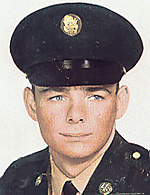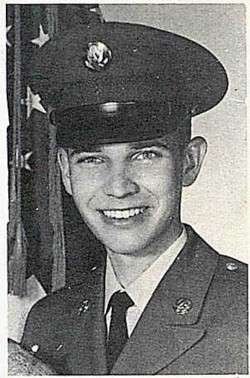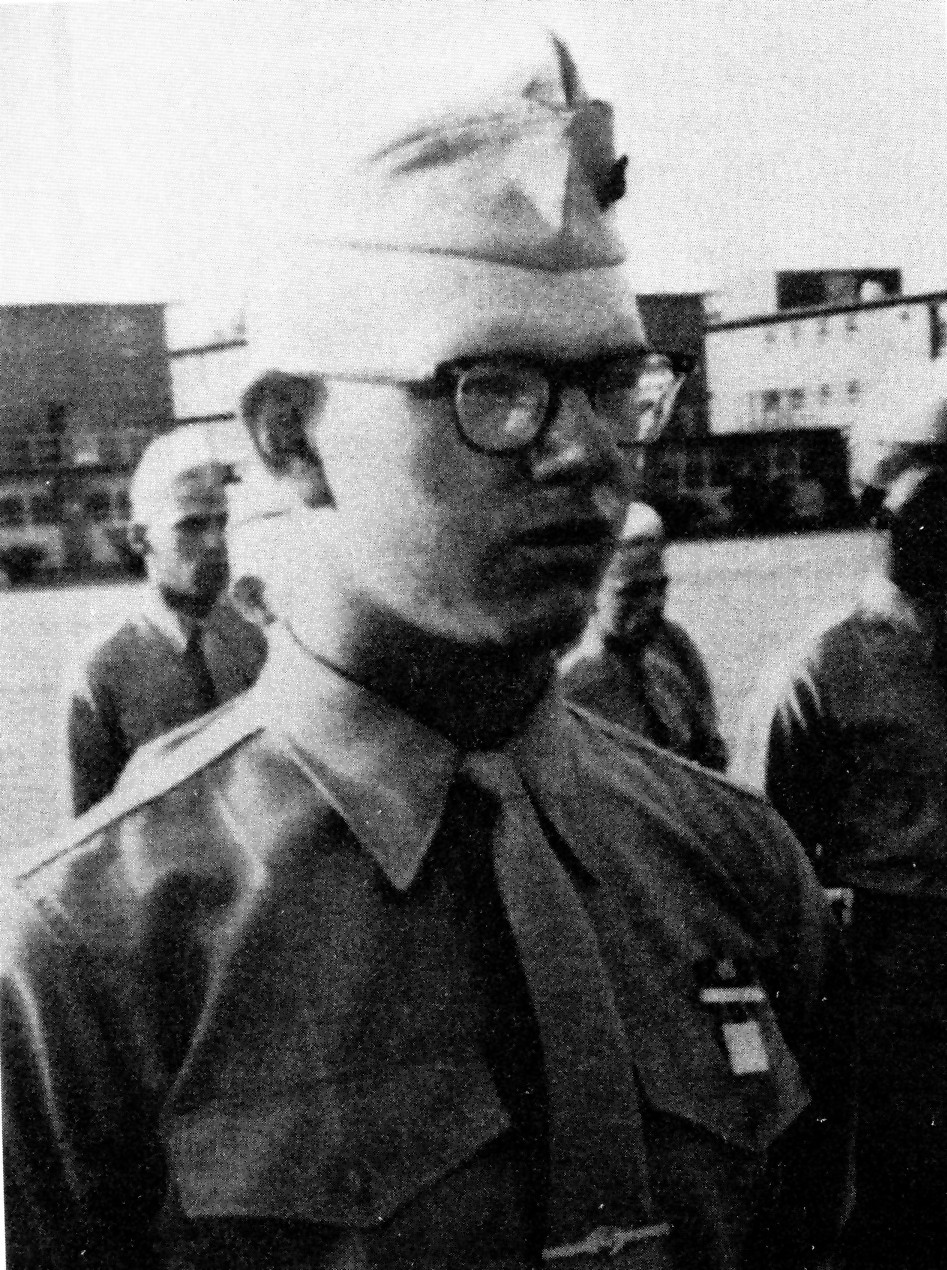
JOHN L JERVIS - SP4
- HOMETOWN:
- pitman
- COUNTY:
- Gloucester
- DATE OF BIRTH:
- May 27, 1946
- DATE OF CASUALTY:
- February 08, 1968
- BRANCH OF SERVICE:
- Army
- RANK:
- SP4
- STATUS:
- KIA
- COUNTRY:
- South Vietnam
Biography
John Leroy Jervis III was born on May 27, 1946, to John and Dorothy Jervis. His home of record is Pitman, NJ. He was the seventh of eight children and was close to his three brothers and four sisters. They enjoyed working and playing together. Even as a child, John was ambitious and often helped his two older brothers with their milk and mail routes. The family enjoyed picnics, as well as trips to the lake and the NJ shore. In his spare time, John liked hunting small game, loved sports, and especially liked playing baseball. He had a hobby of collecting baseball cards of the players he admired.
As a teen, John followed in his father's footsteps by becoming a member of the Pitman Fire Company No. 1. He was not only a charter member of the Junior Fire Company but also went on to become its president.
John graduated from Pitman High School in 1966. In the yearbook by his name is a description of his ambition in life, "to be a friend to everyone." His love for people and his wanting to help them explains why John had so many friends.
He was employed at the Acme Market when he was drafted into the US Army on October 3, 1966. Jervis did his basic training at Fort Dix and was sent to Fort Hood where he spent a year in infantry with Company A, 6th Infantry, 198th Battalion, 1st Brigade. He left for Vietnam on October 28, 1967, as a machine gunner.
While Jervis was in Vietnam he sent many letters to his family in which he talked about how much he missed home. His last letter was written in early February from Tom Ky where he was based. He wrote that he could not write anymore at this time, but that he would correspond as soon as he could more completely. He explained that he was going on a "seek and search" mission.
On February 8, 1968, he was en route to Da Nang when his patrol ran into a Viet Cong ambush. His company was pinned down and sustained severe casualties. So that the wounded could be safely removed, Jervis and twelve other men of his platoon fired on the enemy. He continued to protect his comrades until he was mortally wounded.
John died in the same manner as he lived, loving others. Although John's life was short, his ambition had been fulfilled. He had become a true friend to many and had touched the lives of all those who knew him.
With John's death, his small hometown had suffered its second casualty of the war. The first was his classmate, Bruce Sharp, who was killed only days before. There is a memorial that stands in Pitman in their honor. John was awarded the Purple Heart and the Bronze Star.
Johnny
May 27, 1946 - February 8, 1968
SP4, Army Pitman, NJ
"Of course, I remember him," recalls Al Lounsbury, a Pitman barber for more than forty years. "He worked in my shop for a year and a half. He was as fine a boy as you would want to meet."
Before Johnny left for the service, Al included him in a trip to Yankee Stadium for a Sunday doubleheader. The games were done in time for them to take to Palisades Park. They rode the Cyclone, hit baseballs and ate hot dogs. "Johnny told me it was the best time he ever had in his life," Al says. "He was so appreciative."
When Johnny was drafted in October 1966, family members had their doubts. "I never felt my youngest brother was tough enough to be in the Army to start with," Coxie Brown, Korean War veteran and former Fire Chief in Pitman, says. "They were taking a kid who really was never away from home and putting him in a position like that."
"Johnny was a kid who wanted to do everything at once. He was a hustler and a hard worker," Coxie remembers. "The older boys gave him a hard time once because when he came home on leave, he started shoveling snow from the sidewalk. `You're supposed to relax,' we would say. But we knew that was impossible with that boy."
After basic and advanced training, Johnny arrived in Vietnam with the 198th Light Infantry Brigade in October 1967. The brigade operated out of Chu Lai, which is in Quang Nam province, the second most northern province of South Vietnam. His unit, Company A, 1st Battalion, 6th Infantry had been assigned to secure and hold a vital bridge.
Donald Hammett of Indianola, Mississippi, was a 23 year old Staff Sergeant in 1968. He retired in 1992, after 27 years of service and two tours of Vietnam.
"I was in charge of a five man squad," he says. "It consisted of two M-60 machine gunners, two assistants and myself. My gunners were John Jervis and Ralph Dahm. The assistants were Kenneth Hand and David Duarte. We were a close team. We had to be because survival depended on each man doing his assigned job."
"During our acclimation in Vietnam, we were assigned the task of bridge security," Hammett continues. "Things were a little dull and boring. In December, the action picked up a little and we were on missions in the rice paddies and sometimes climbing hills searching for the enemy. It was then that we had our first real encounter. Afterwards, we were all awarded the Combat Infantryman's Badge."
"J.J. (we all called him that) was a very serious individual. He took his job seriously. We each had the goal of going home alive. He was sort of tall and lanky. Ralph, on the other hand, was a big and chunky fellow from Wisconsin. Hand and Duarte were both quiet. J.J. was pretty darn good with the M-60. He always kept it in superb condition and didn't have to be reminded to keep it clean."
"For the most part, the guys that were drafted into the Army accepted it and made the most of it. J.J. was no exception. We had a job to do and we did it well. I'm sure there were some who resented Uncle Sam taking them out of their cozy environment, but I know J.J. believed in what we were doing."
On February 8th, A Company was on a Search and Destroy mission just south of Da Nang. The Tet offensive was in its' second week and contact with the enemy was intense and frequent. Don Hammett continues his story.
"One minute we were on line crossing a rice paddy on the way to a small village and then all of a sudden all hell breaks loose. We all fell to the ground. I remember firing into the village and then fragments of a mortar shell ripped through my body. In the next second, I was being pulled to a graveyard for safety."
The letter the Jervis family received from the unit commander in March tells what happen next.
The company was hard hit and had to pull back temporarily. John and twelve other men took up a defensive position to hold the enemy back while their wounded comrades were taken to safety. After bitter fighting, at close quarters, their effort was successful but only at the sacrifice of their own lives.
Hammett was evacuated and spent four months recuperating in Japan. Both his machine gunners and several others were killed. "When I was told how many men died from the second platoon, I just wept. 'How could this sort of thing happen to us?' I returned to Vietnam on the day Robert Kennedy was assassinated. I still had four months to do."
"Upon my return to the states, I felt somehow that I left something behind. Maybe it was the thought of losing these guys and I wanted revenge. Whatever it was, I again volunteered for Vietnam and returned in October of 1970. Stateside duty just didn't suit me. I was with an Advisory Group Team and in December, our base camp was overrun and I sustained the loss of an eye."
The same morning two Army officers visited Dot Jervis to tell her of the death of her son, the memorial service was being held for Bruce Sharp, Jr., killed eight days before.
"When I came to the door and saw the officer, I just knew..." she says. "And then when I looked over his shoulder, the Sharp's funeral procession was passing in front of our house. That's a hard feeling to describe."
Later that same day, another knock on the door was that of Bruce Sharp, Sr. and his wife, Alice. They brought them some food and compassion at a time they all needed to somehow share their terrible losses.
"Alice Sharp and I became very close after that. They were fine people," recalls Dot. "And my family took great care of me and moved in until we buried Johnny. We didn't get his body back for over a week. The girls wouldn't let me do anything around the house."
Dot's second husband, Roy Jervis, never thought of any of the kids as other than his own. There were eight all together, four boys and four girls. They all called him 'Pop' and when the Army initially provided only a general account of what happened to Johnny, he needed to know more.
John Martenis was wounded in the same firefight. On crutches, with an arm in a sling and a very heavy heart, he came to Pitman from northern New Jersey to pay his respects and was able to provide Roy with some details. The fact that Martenis made the trip at all is testimony to how Johnny's buddies felt about him. In that, there was comfort and the family remains grateful.
John Jervis was buried at Cedar Green Cemetery in Clayton after services at Pitman Methodist Church on February 24, 1968.
The four sisters, Judy Beebe, Linda Ott, Karen Burns and June Allen, joined Dot and another of Johnny's brothers, Don Brown, for an evening of celebrating his life. There were tears all around, and yet the love and joy of their brother brightened the spirits of everyone.
"I took out all two hundred of his letters the other night," Linda says. "They were happy letters; they weren't sad. He met some nice boys and was very close to them. And he always would remember to ask about his friends at the Acme where he worked. He always asked for Kool-aid, too."
"I know he loved his nieces and nephews," Judy recalls. "My Steve was three and Johnny would parade around the house with him in his arms singing, `When Johnny Comes Marching Home Again'. That was Stevie's favorite song."
"I still hear from one of Johnny's girlfriends," Dot adds. "She always writes around May, his birthday. She told me she would never forget and she hasn't."
Don remembers Johnny helping him on his paper route. "He would ride on top of the basket, throwing papers while I would pedal. He would also go with me when I had a milk delivery route. He was so energetic that we couldn't keep him still. He lived to be a fireman, too. He was always at the fire company and was president of the Juniors for a while."
"John always had money," June says. "He worked hard for it and tried to save every bit that he could. He probably kept the first dollar he made."
June was the youngest of the eight and was the only one still living at home when Johnny went into the Army. "I remember Johnny being close to a lot of people. There was always one of his friends around. I was the only one who could look at him as a big brother. And he was the best big brother I could have wanted."
Karen Burns feels that the discussion was therapeutic for all. "We've never done this before and it's comforting to know that we all share the same feelings. We were brought closer by Johnny's death and we are now realizing the impact he had on all of us. Johnny is still bringing us together."
Karen's birthday is February 6th, two days before the anniversary of Johnny's death. She finds it hard to celebrate. And because her oldest son, Ricky, is the spitting image of Johnny, she is constantly reminded of her brother when dealing with her son.
"It's tough sometimes, but Ricky is a great kid, too, and we love him very much," Karen says. "All the comparisons are favorable."
Sam Brown was Dot Jervis' oldest son. He was a Korean War veteran and knew what Johnny was doing the last months of his life. The family remembers Sam's return from Korea and his effort to re-establish himself as the big brother.
"Sam took Johnny's death very hard," Dot recalls. "We all did, but Johnny was the baby and Sam felt he should have somehow protected him."
Sam died in 1982. Dot Jervis lost her youngest in Vietnam and her oldest to cancer. "I have six children left and a ton of grandchildren," she says. "And I know they all have been influenced greatly by the lives of Johnny and Sam."
Johnny's death was very difficult for the whole family. They would never really accept it until sixteen years later when `Pop' was very sick and dying.
"I'll never forget holding his hand and seeing the expression of pain and suffering suddenly leave his face," Judy recalls. "He just smiled and had this wonderful look. There is no doubt my father died a peaceful death knowing that Johnny was waiting for him."
Another round of tears circled the kitchen table as the rest of the family silently agreed.
Don Hammett would like Johnny to be remembered as a courageous young man who made the ultimate sacrifice for his country. "J.J. and all the others are my heroes," he adds.
Johnny Jervis' life was as full as it could be for twenty-one years. He left an impression on everyone who knew him. His legacy is perhaps best described by someone who never met him. Rebecca Brown, Don's daughter, wrote a paper for her senior English composition class in November of 1992. She wonders what Johnny would be like to talk to in person and how the war would have changed him. In her closing, she shows the respect and admiration she has for the uncle who died before she was born.
I know that if Uncle Johnny were here today, I would be able to learn a great deal from him. Many people today are too selfish to help someone in simple everyday tasks, let alone give their lives for that same person. Maybe we all need to learn from someone like my Uncle Johnny because then we could all truly be a friend to everyone!
Excerpt from They Were Ours: Gloucester County's Loss in Vietnam
by John Campbell
Used with persmission of the author
Sources: Judith A. Beebe (sister), John Campbell and NJVVMF.
Remembrances
Be the first to add a remembrance for JOHN L JERVIS
Help preserve the legacy of this hero, learn about The Education Center.
LEARN MORE

